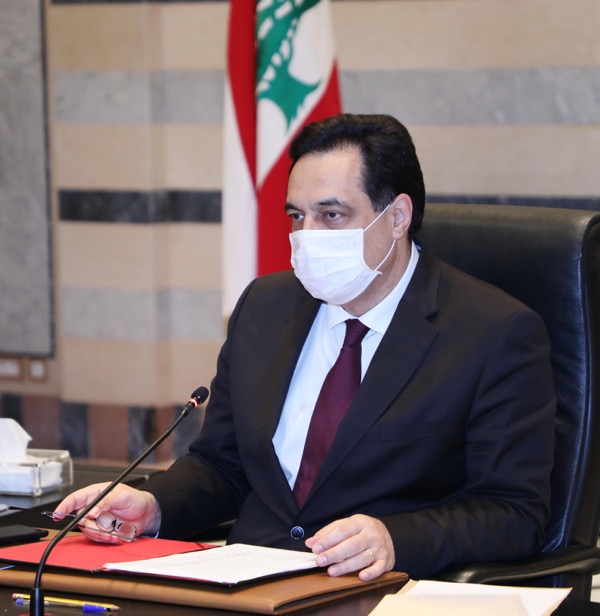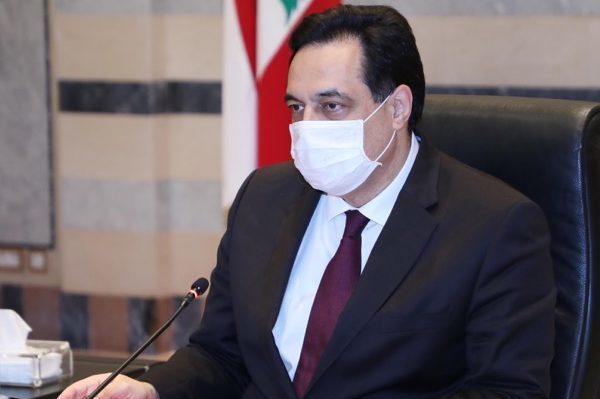Economists warn central bank decision to allow US dollar withdrawals in Lebanese pounds could trigger hyperinflation.

Lebanon’s Prime Minister Hassan Diab said Wednesday that the Banque du Liban, the country’s central bank, was going against government policy by allowing all depositors to withdraw money from foreign currency-denominated accounts in the rapidly depreciating local currency.
“We were not consulted on this matter,” Diab told Al Jazeera, following a parliament session. He added in remarks to reporters that he would have “strong words” about the issue after a Friday Cabinet session.
Lebanon’s central bank said on Tuesday that all depositors with foreign currency stuck in the Lebanese banking system due to harsh capital controls could withdraw their money in local currency, at “a market exchange rate” to be determined by banks.
Monetary policy in the economically ravaged nation has been very fluid of late, and the process surrounding major changes is opaque, which can and does sow confusion.
Adding to the chaos – Lebanon has at least four exchange rates. There’s an official rate that hasn’t changed for 23 years and generously values the Lebanese pound at 1,507.5 pounds to $1. There’s also a parallel market rate that values the Lebanese pound at a far less forgiving but more realistic 3,000 or 3,300 to $1. Then there’s a black market rate that’s even more punishing toward the Lebanese pound. And finally, a market rate of 2,600 Lebanese pounds to $1 set by the central bank for small depositors who want to withdraw money from their foreign currency-denominated accounts under $3000.
Tuesday’s decision by the Banque du Liban or central bank is significant because prior to it, depositors were forced to withdraw US dollars in Lebanese pounds at the official exchange rate, which effectively left half the value of their savings on the table.
The central bank’s new policy now gives all depositors a potential way to unlock their foreign currency deposits at a rate that more accurately reflects the true value of the Lebanese pound. However, that rate will be set by banks, and could still value the Lebanese pound more favourably than prevailing parallel market rates.
But many depositors could seize the opportunity to unlock savings they have not been able to withdraw. That leads to a real sting in the tail, say analysts, because when a wave of depositors suddenly converts foreign exchange savings into a rapidly depreciating local currency, it could feed speculative attacks on the Lebanese pound, resulting in hyperinflation.
The Central bank though limited the withdrawal to the equivalent of $5000 a month
‘Hyperinflation is knocking’
Omar Tamo, a Lebanese foreign exchange specialist, told Al Jazeera that the central bank’s Tuesday decision could indeed “decrease the hidden haircut” depositors were forced to endure when forced to convert savings at the official exchange rate.
But the new directive also pushes Lebanon’s economy towards full-blown liraficaiton (The Lebanese pound is also referred to as the Lebanese lira) – the process of effectively forcing the conversion of US dollars into local currency.
“Hyperinflation is knocking on our doors,” Tamo said.
Lebanon is grappling with its worst-ever financial crisis rooted in decades of corruption, mismanagement and faulty policies. Banks have few real dollars left to match over $110bn in dollar-denominated deposits, having lent the money to the Banque du Liban and successive governments, while a portion is also tied up in nonperforming loans to the private sector.
A draft government rescue plan estimates banks have $83bn in losses and calls for a “haircut” or loss borne by large depositors to help fill the gap.
Diab said last week that 98 percent of depositors would not be affected. This roughly equates to anyone with an account under $500,000.
But the central bank’s policy change on Tuesday effectively puts Diab’s promise in peril.
Big needs, little aid
Diab said that his government would finalise its rescue plan by next week.
Meanwhile, protests are growing in defiance of a nationwide lockdown over coronavirus as people struggle to make ends meet. Thousands of Lebanese have lost their jobs since last year as businesses crumbled along with the economy. That process accelerated in the wake of COVID-19 containment measures, and few of the jobless have received any government aid.
A number of MPs warned during Wednesday’s Parliament session that Lebanon may soon face a social catastrophe, but so many had left the chamber by the end of the session that quorum was lost.
This meant that a vote could not be held on the government’s proposal for 1,200 billion Lebanese pounds ($400m) in aid for farmers, vocational workers, industrialists and small to medium-sized businesses.
“This is necessary so that Lebanese society can keep going for the next months,” Diab said to the remaining MPs.
ALJAZEERA


Leave a Reply
You must be logged in to post a comment.